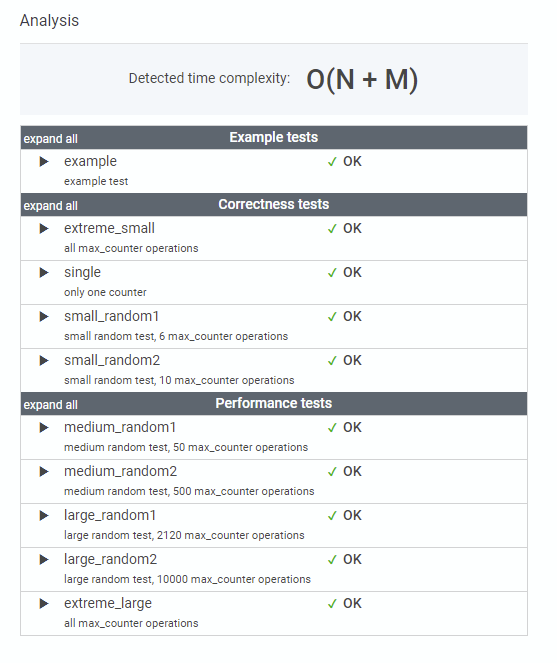Lesson 4 Counting Elements MaxCounters 나만의풀이
문제
You are given N counters, initially set to 0, and you have two possible operations on them:
- increase(X) − counter X is increased by 1,
- max counter − all counters are set to the maximum value of any counter.
A non-empty array A of M integers is given. This array represents consecutive operations:
- if A[K] = X, such that 1 ≤ X ≤ N, then operation K is increase(X),
- if A[K] = N + 1 then operation K is max counter.
For example, given integer N = 5 and array A such that:
A[0] = 3 A[1] = 4 A[2] = 4 A[3] = 6 A[4] = 1 A[5] = 4 A[6] = 4
the values of the counters after each consecutive operation will be:
(0, 0, 1, 0, 0) (0, 0, 1, 1, 0) (0, 0, 1, 2, 0) (2, 2, 2, 2, 2) (3, 2, 2, 2, 2) (3, 2, 2, 3, 2) (3, 2, 2, 4, 2)
The goal is to calculate the value of every counter after all operations.
Write a function:
- def solution(N, A)
that, given an integer N and a non-empty array A consisting of M integers, returns a sequence of integers representing the values of the counters.
Result array should be returned as an array of integers.
For example, given:
A[0] = 3 A[1] = 4 A[2] = 4 A[3] = 6 A[4] = 1 A[5] = 4 A[6] = 4
the function should return [3, 2, 2, 4, 2], as explained above.
Write an efficient algorithm for the following assumptions:
- N and M are integers within the range [1..100,000];
- each element of array A is an integer within the range [1..N + 1].
대충 해석하면 N개만큼의 counters가(간편하게 배열이라고 생각하자) 있고 A[K]의 값을 X라고 하면
X가 1<= X <= N 이면 counters의 X번째는 + 1
X가 N+1 이면 counters중 가장 큰 counter로 전부 변환한다.
첫 번째 시도
23분 걸려서 만든 거..
그렇게 어렵게 생각하지 않은 코드다.
def solution(N, A):
counters = [0 for _ in range(N)]
for i in A:
if i == N + 1:
excounters = sorted(counters)
for j in range(N):
counters[j] = excounters[-1]
else:
counters[i-1] += 1
return counters
아무래도 counters를 초기화하는 문제 때문에 O(N*M)이 나온 듯하다
두 번째 이후로 아주 많은 시도....
진짜로 한참 동안 고민했다.
합하면 2시간 넘게 걸린 문제, 대략 2시간 30분 정도 걸린 듯하다
어떻게 하면 for문을 하나로 돌릴까...
최댓값을 이용하면 되는건 알겠는데 거의 다 왔는데 끝에서 막힌 느낌이 들어서 계속 생각했다.
조금씩 조금씩 수정하면서 만들었던 코드다.
def solution(N, A):
counters = []
c = {}
maxnum = 0
for i in A:
if i<N+1:
if i in c:
c[i] += 1
else:
c[i] = 1
else:
if c:
if maxnum == 0:
maxnum = sorted(c.values())[-1]
else:
maxnum += sorted(c.values())[-1]
c = {}
counters = [maxnum for _ in range(N)]
if c:
for i in c:
counters[i-1] += c[i]
return counters

풀이과정을 다시 복기해보자면
X가 N+1이 될 경우엔 counters의 최대값을 관리해주는 것이 관건이므로
c라는 dict를 만들어 일반 상황일 땐 c+=1을 해주고
만약 X = N+1이라면 dict 중 최댓값을 구하여 maxnum에 저장해둔다
만약 나중에 또 X = N+1이 나올 것을 대비하여 maxnum이 0이 아닌지를 체크한다.
그리고 처음부터 X = N+1이 나와버리는 불상사가 발생하게 된다면 빈 c dict에서 에러가 나게 되어버리므로
if c: 를 넣어 c가 있는지 체크를 했다.
진짜 거의 다 풀었는데 뭔가 하나를 틀려서 배열로 돌아갔다가, 약한 참조 하는 방법 찾다가
다시 돌고 돌아 dictionary로 풀었다.
만약 안 돌아가고 dict로 계속 팠으면 1시간이면 풀었을 문제...
막상 풀고 나니 이렇게 쉬웠던 문제를 왜 못 풀었는지 자괴감이 든다 :(